Stratos Payoumtzis
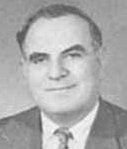 Stratos Payoumtzis was born in Asia Minor in 1902 and left for Greece around 1918.
Payoumtzis possessed one of the great voices of rebetiko. He made hundreds of recordings
beginning in 1933, many with Tsitsanis. His later years were hard, and he died on stage
during a working visit to the USA in 1971. A collection was made to ship his body home.
Stratos Payoumtzis is considered to be the one greatest Greek singers of all time. He was
born in Asia Minor (Aivali), and came to Greece, a few years before the catastrophe of
1922. He was the closest friend of the great Markos Vamvakaris and was a member of the
"Legendary Tetras of Piraeus". The greatest composers trusted his talent and his unique
voice and gave him their best songs, some of them were Giorgos Batis, Anestis Delias,
Markos Vamvakaris , Tsitsanis, Papaioannou, Keromitis, Bagianteras, Tountas, and
Papazoglou.
Stratos Payoumtzis was born in Asia Minor in 1902 and left for Greece around 1918.
Payoumtzis possessed one of the great voices of rebetiko. He made hundreds of recordings
beginning in 1933, many with Tsitsanis. His later years were hard, and he died on stage
during a working visit to the USA in 1971. A collection was made to ship his body home.
Stratos Payoumtzis is considered to be the one greatest Greek singers of all time. He was
born in Asia Minor (Aivali), and came to Greece, a few years before the catastrophe of
1922. He was the closest friend of the great Markos Vamvakaris and was a member of the
"Legendary Tetras of Piraeus". The greatest composers trusted his talent and his unique
voice and gave him their best songs, some of them were Giorgos Batis, Anestis Delias,
Markos Vamvakaris , Tsitsanis, Papaioannou, Keromitis, Bagianteras, Tountas, and
Papazoglou.
Marika Papagika
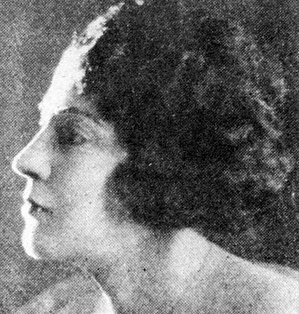 One of the first generation of Greek women singers to be heard on sound recordings, Marika
Papagika was born on the island of Kos on September 1, 1890. Her family moved to Egypt,
probably Alexandria, when she was young. She began her career in this country, working
in nightspots that catered for the large resident Greek community. It is likely that she
made her first recordings here as well. Around 1915 she emigrated to the USA where she
continued performing and recording. By the mid-1920's she and her husband Kostas ['Gus'],
a cimbalon player, had their own club in New York. She regularly worked with the fine
violinist Athanasios Makedonas. Marika's versatile repertory included folksongs, 'light'
European-style songs, but she became a noted exponent of the Smyrnaic style of the
rebetiko songs.
One of the first generation of Greek women singers to be heard on sound recordings, Marika
Papagika was born on the island of Kos on September 1, 1890. Her family moved to Egypt,
probably Alexandria, when she was young. She began her career in this country, working
in nightspots that catered for the large resident Greek community. It is likely that she
made her first recordings here as well. Around 1915 she emigrated to the USA where she
continued performing and recording. By the mid-1920's she and her husband Kostas ['Gus'],
a cimbalon player, had their own club in New York. She regularly worked with the fine
violinist Athanasios Makedonas. Marika's versatile repertory included folksongs, 'light'
European-style songs, but she became a noted exponent of the Smyrnaic style of the
rebetiko songs.
She and her husband apparently lost the nightspot in the great financial crisis of 1929, and her recording career ended in the late 1930's. Marika died in New York in 1943; some said that she died of disappointment.
Yiannis Papaioannou
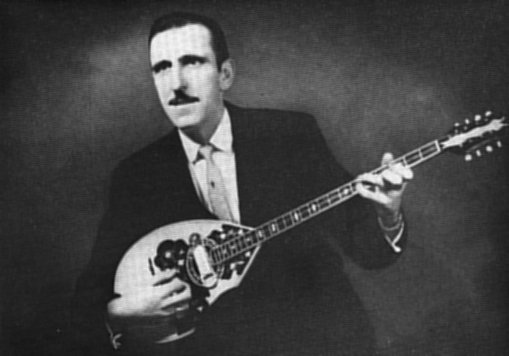 Yiannis Papaioannou (1913-1972) was born in Kios, Asia Minor, on January 18, 1913 and
he came to Greece as a refugee when he was 9 years old. He first moved with his mother
and grandmother to the island of Samothrace before settling in Piraeus. After his brief
stint as a footballer came to an end as a result of an injury, Papaioannou devoted
himself to songwriting. He is considered by some to be the first song writer to have
taken bouzouki music out of the "teke" (drug den), making it more acceptable to the
non-hashish smoking strata of Greek society. The multi-talented Papaioannou's music
varies from old-style rebetika ("Pente Ellines ston Adi", "O boufetzis"), to oriental
("Cifteteli", "Karabiberim") and even island music (Kapetan Andreas Zeppo).
Yiannis Papaioannou (1913-1972) was born in Kios, Asia Minor, on January 18, 1913 and
he came to Greece as a refugee when he was 9 years old. He first moved with his mother
and grandmother to the island of Samothrace before settling in Piraeus. After his brief
stint as a footballer came to an end as a result of an injury, Papaioannou devoted
himself to songwriting. He is considered by some to be the first song writer to have
taken bouzouki music out of the "teke" (drug den), making it more acceptable to the
non-hashish smoking strata of Greek society. The multi-talented Papaioannou's music
varies from old-style rebetika ("Pente Ellines ston Adi", "O boufetzis"), to oriental
("Cifteteli", "Karabiberim") and even island music (Kapetan Andreas Zeppo).
Although primarily a song writer, Papaioannou was also an accomplished bouzouki player whose "Taksim" remains a unique instrumental masterpiece to this day. He died in a traffic accident near Elefsina on August 3, 1972.
Evangelis Papazoglou
Evangelis Papazoglou was born in Smyrna in 1895 was one of Rebetiko’s great composers and played several instruments. He was a man of strong principles and refused to submit any songs for publication after censorship was imposed by the Metaxas dictatorship in 1937. He gave up music after the Axis occupation of Greece in 1943, and became a junk collector. He died of TB in 1943 in Piraeus, one of several leading rebetika figures who failed to survive WWII.
Spiros Peristeris
 Spiros Peristeris was born in Smyrna in 1900 and died in Athens in 1966. He was a
gifted multi-instrumentalist who for many years was recording director at
Odeon/Parlophone and often participated on records he supervised. Spiros
Peristeris was one of the most influential figures in early Rebetika music.
His activities as a composer, multi-intrumentalist and recording director had a
major impact on the music. He went to Italian night school in Constantinople and
became famous as chief mandolinist in a prestigous Smyrna string ensemble. He was
recording director at Odeon/Parlophone. As recording director, he arranged for
the first recording of Markos Vamvakaris after the success of the bouzouki record
"Minore Tou Teke" by the Greek-American Ioannis Halikias. He played on many of the
recording sessions he supervised, playing mandolin, bouzouki, guitar or piano. He
worked with the all the famous musicians from the 1930's; Kostas Roukounas, Markos
Vamvakaris, Stratos Payoumtzis, Roza Eskenazi, Rita Abadzi, Antonis Dalgas, Kostas
Skarvelis, Kasimates, Keromitis and more. He also recorded many songs under his own
name or various pseudonyms. His bouzouki playing was nothing short of spectacular.
The instrument he is heard playing on many of his recordings is not known. It may have
been a bouzouki or a guitar, or possibly a trichordo bouzouki with single strings
instead of pairs, thus making it a 3 string bouzouki.
Spiros Peristeris was born in Smyrna in 1900 and died in Athens in 1966. He was a
gifted multi-instrumentalist who for many years was recording director at
Odeon/Parlophone and often participated on records he supervised. Spiros
Peristeris was one of the most influential figures in early Rebetika music.
His activities as a composer, multi-intrumentalist and recording director had a
major impact on the music. He went to Italian night school in Constantinople and
became famous as chief mandolinist in a prestigous Smyrna string ensemble. He was
recording director at Odeon/Parlophone. As recording director, he arranged for
the first recording of Markos Vamvakaris after the success of the bouzouki record
"Minore Tou Teke" by the Greek-American Ioannis Halikias. He played on many of the
recording sessions he supervised, playing mandolin, bouzouki, guitar or piano. He
worked with the all the famous musicians from the 1930's; Kostas Roukounas, Markos
Vamvakaris, Stratos Payoumtzis, Roza Eskenazi, Rita Abadzi, Antonis Dalgas, Kostas
Skarvelis, Kasimates, Keromitis and more. He also recorded many songs under his own
name or various pseudonyms. His bouzouki playing was nothing short of spectacular.
The instrument he is heard playing on many of his recordings is not known. It may have
been a bouzouki or a guitar, or possibly a trichordo bouzouki with single strings
instead of pairs, thus making it a 3 string bouzouki.
Stellakis Perpiniadis
 Stellakis Perpiniadis was a singer and guitarist. He was born on the island of Tinos
in 1899. He was the 11th (and final) child born to the family! Stellakis father was
from Tinos and his mother from the island Hios. In 1900 the family moved to Alexandria,
and thence on to Constantinople in 1906. Stellakis' early years were difficult, and
the family were poor. His father worked as a baker in Galata. Stellakis received only
a little formal schooling before joining his father in the baking trade to help the
family make ends meet.
Stellakis Perpiniadis was a singer and guitarist. He was born on the island of Tinos
in 1899. He was the 11th (and final) child born to the family! Stellakis father was
from Tinos and his mother from the island Hios. In 1900 the family moved to Alexandria,
and thence on to Constantinople in 1906. Stellakis' early years were difficult, and
the family were poor. His father worked as a baker in Galata. Stellakis received only
a little formal schooling before joining his father in the baking trade to help the
family make ends meet.
Whilst living in Galata, Stellakis joined psalters in St John's church and he learned ecclesiastical music. In 1919 he embarked for army service for the Greek army first in Athens and subsequently in Smyrna. In 1922 he left Smyrna as a refugee and went to the island of Hios and then to Piraeus where he worked in a paint shop. In 1925, he met Manoli Margaroni at a wedding and Manoli helped Stellakis by buying him his first guitar and teaching him how to play it as well as encouraging him to become a singer. Stellakis became a performer at fetes and at tavernas in Pireaus. In 1929 Stellakis met Panagiotis Toundas and recorded some sides which became hits. Stellakis met and worked with the greatest artists and composers of that era, and also composed many classic songs himself which became classics. He recorded in many musical styles, including Rebetiko, Smyrneika, Nisiotika (island songs), Demotika and Laika. He also recorded many popular duets with artists such as Stratos Payioumtsis, Roza Eskenazi, Rita Ambatsi and Anna Politissa.
Stellakis opened his own taverna towards the end of the 1930s. Apart from the period from 1942 - 1945 (when the recording companies in Greece were closed) Stellakis made recordings right up to the 1960s. In the 1970's Stellakis made many appearances in his taverna, concerts and on TV. He died at his home in Haidari in September 1977. Stellakis son, Vangellis, went on to became a very successful composer and recording artist in his own right - primarily in the laika field.
Kostas Roukounas
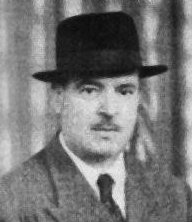 Kostas Roukounas was born in Neo Karlovasi on the island of Samos (hence his nickname
"Samiotaki") in 1903. His father Apostoli left for the USA when Kostas was 2 years old,
and subsequently divorced his mother Eftihia (she remarried and went on to have three
further children).
Kostas Roukounas was born in Neo Karlovasi on the island of Samos (hence his nickname
"Samiotaki") in 1903. His father Apostoli left for the USA when Kostas was 2 years old,
and subsequently divorced his mother Eftihia (she remarried and went on to have three
further children).
As the family was very poor, Kostas started work at the age of 8 for a cigarette manufacturer, and worked there for 7 years. Around 1920 Kostas began working as a carpenter or joiner and became known throughout Samos as an expert craftsman. Around 1927 Kostas started singing (primarily Smyrnaic songs) at the best taverna in Nea Karlovasi - Pansamiakon. Within a few months of starting his singing career, his stunning vocals had enchanted most of the islanders. In 1928 he left Samos seeking to further his career by moving to mainland Greece and singing in and around Athens at weddings, baptisms and fetes.
By 1929/1930 news of his exceptional talent reached Panayiotis Tountas who sought Kostas out and arranged for him to make 78 rpm recordings. Kostas swiftly recorded many songs excelling at each style - including Rembetika, Dimotika, Kleftika, Amanedes, songs from Smyrna and Constantinople, and Nisiotika (island songs). He worked with many of the founding artists of Rembetika and Smyrnaic schools of music. Roukounas could tackle the most technically difficult songs (particularly Amanedhes) with ease. Additionally, he composed many classic songs himself.
Kostas married Anna Politissa (also a talented singer) in 1934. He also started working at Mitsou tou Mourosis, and stayed there until the Nazis entered Athens in 1941. Tragically, his wife Anna died of a heart attack in March 1943. Kostas continued working after the War and through the 1950s/1960s including stints at Tsitsifies and Fat Jimmy's. In 1948 he married the lyricist Alexandra Kiriasi.
In 1958 he toured USA for a year to great success. With the Rebetiko revival in the 1970s, Kostas returned to concerts and appearances at tavernas and recorded a number of LPs of traditional, Smyrniac and Rembetic songs. Kostas lived with his wife Alexandra at their home in Pallini until his death in March 1984 aged 80.
Dimitris Semsis
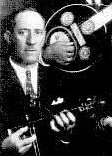 Dimitris Semsis was born to Greek parents around 1883 in Stromnitsa. His family moved to
Thessaloniki while he was still a child (which led to his nickname in later
years - 'Salonikios'). Dimitris began to learn violin when he was about 10, and became
a virtuoso violinist. At the turn of the century, he joined the band of a circus which
travelled extensively over the Balkans. He later joined other touring orchestras and
played in Turkey, Syria, Egypt, Sudan and elsewhere. Around 1920, he went to Smyrna and
met musicians and composers of the Smyrnaic school. In September 1922, Dimitris was among
the many Greeks expelled from Smyrna and arrived in Greece a refugee. In 1923 he
married Dimitra Kanoula, and they had 4 children.
Dimitris Semsis was born to Greek parents around 1883 in Stromnitsa. His family moved to
Thessaloniki while he was still a child (which led to his nickname in later
years - 'Salonikios'). Dimitris began to learn violin when he was about 10, and became
a virtuoso violinist. At the turn of the century, he joined the band of a circus which
travelled extensively over the Balkans. He later joined other touring orchestras and
played in Turkey, Syria, Egypt, Sudan and elsewhere. Around 1920, he went to Smyrna and
met musicians and composers of the Smyrnaic school. In September 1922, Dimitris was among
the many Greeks expelled from Smyrna and arrived in Greece a refugee. In 1923 he
married Dimitra Kanoula, and they had 4 children.
By the end of the 1920s, Dimitris was recording director at HMV and Columbia, a role of great influence that he retained throughout the 1930s - 1940s. In the 1930s, Dimitris recorded extensively with Roza to great acclaim, and often accompanied her in tavernas along with Agapios Tomboulis, Lambros Savaidhis and Lambros Leonaridhis. His compositions were also recorded by the greatest artists of the day including Rita Ambatsi, Dalgas, Stellakis Perpiniadis, and Stratos Payiomtsis. He wrote Rembetic and Demotic songs, as well as Smyrnaika and Amanedes. As is clear from recordings, Dimitris was, without doubt, the greatest violinist who recorded in the Rembetic/Smyrnaic style. He recorded many hundreds of sides, and we are fortunate that many of them have been re-released in recent years.
After a short illness, Dimitris Semsis died of cancer in Athens on 13 January 1950.